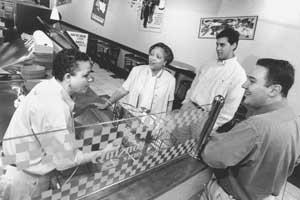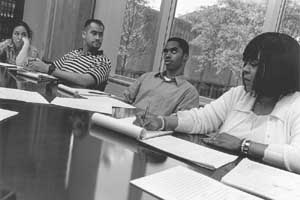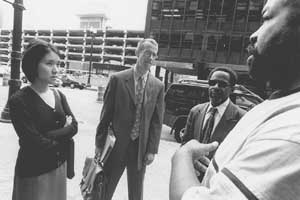Law School Clinics directly involve students in pro bono work, litigation
By Peter SchulerNews Office
 Patricia Lee, Lecturer and Director of the Institute for Justice Clinic on Entrepreneurship in the Law School (second from left), and two of her students visit with a client at her place of business. The clinic’s goal is to provide pro bono legal advice to help entry-level businessmen and women start businesses and keep them successfully operating. |
“Suppose a clinic were attached to a Law School,” Edward Levi suggested to the Chicago Legal Club in 1951. Levi, who would go on to distinction as University Provost and President as well as U.S. Attorney General, was at that time Dean of the Law School. “It would be possible then to take a number of students and have them assist in the preparation of cases. If the work of the clinic were of high quality, there seems little doubt that it would fill a public need, while at the same time it would provide an opportunity for research and training.”
Levi’s idea for a legal clinic was a radical concept at the time, but clinics are now an integral component of legal education at law schools throughout the United States. At the University, his vision has been realized in three very different clinics that have all achieved national recognition.
Housed in the Arthur O. Kane Center at the east end of the Law School complex, these three clinics offer varied opportunities for students to act as legal practitioners while pursuing their degrees. Closely supervised by the clinical teachers, second- and third-year students learn litigation, legislative advocacy and transactional skills as advocates for the clinics’ clients. Eighty students have been chosen to participate in the clinical programs this year.
 Herschella Conyers (far right), Clinical Assistant Professor in the Law School, conducts a meeting with Law School students who are gaining experience in the practice of law while they are involved in cases conducted by the Edwin F. Mandel Legal Aid Clinic. The clinic pursues advocacy in the areas of criminal and juvenile justice, mental health, police accountability and employment discrimination. |
The Edwin F. Mandel Legal Aid Clinic, the oldest of the three, was established in 1957 and is a joint venture of the Legal Aid Bureau of United Charities and the Law School. Staffed by a social worker and five clinical professors, including Randolph Stone, Randall Schmidt, Craig Futterman, Herschella Conyers and the clinic’s Interim Director Mark Heyrman, the Mandel Clinic has been a model for the successful integration of formal legal education with actual experience in the practice of law. The clinic pursues advocacy in the areas of criminal and juvenile justice, mental health, police accountability and employment discrimination. Michelle Geller, Social Services Supervisor in the clinic, and students from the School of Social Service Administration provide social work services to clinic clients and also engage in policy advocacy.
The Mandel Clinic’s Mental Health Advocacy Project, led by Heyrman, is representative of the clinic’s active engagement with significant issues in U.S. society. Students have the opportunity to work directly with clients on cases focused on improving the quality and quantity of community mental health services and the quality of care in state mental hospitals. Earlier this year, Heyrman was named Mental Health Person of the Year by the Mental Health Association in Illinois for the legislative advocacy work done by him and the students enrolled in the Project, and Conyers was appointed to the State of Illinois’ Legislative Task Force Studying Persons with Mental Illness in the Juvenile Justice System, on which Heyrman serves as a representative of the Illinois State Bar Association.
“Students take this work seriously,” Heyrman said. “They know that for most of our clients they may be the only person for the client to depend upon. Because of the scarcity of legal services for poor people, our clients often have nowhere else to turn.”
An example of recent litigation is the pro bono defense of a man confined for many years at Elgin Mental Health Center following a trial in which he was acquitted by reason of insanity. Several years ago, the project successfully appealed a Cook County Circuit Court decision refusing to grant a request for the man’s conditional release. After a violation of the conditions of his release, the court revoked his release.
The project appealed, and the Illinois Appellate Court unanimously reversed the decision and ordered a hearing on the conditions that should be imposed on his re-release. So far, six law students have worked on various parts of this lengthy litigation.
 Locke Bowman, Lecturer and Director of the MacArthur Justice Center in the Law School (second from left), meets with a client in Chicago. |
The Institute for Justice Clinic on Entrepreneurship, led by Patricia Lee, Director of the Institute for Justice Clinic on Entrepreneurship and Lecturer in Law, and assisted by John Stinneford, Assistant Director of the Institute for Justice Clinic on Entrepreneurship and Lecturer in Law, is a joint project of the Law School and the Institute for Justice, a Washington-based conservative and libertarian public interest law firm that advocates for economic liberty.
The clinic’s goal is to provide pro bono legal advice to help entry-level business people start businesses and keep them operating successfully.
In one current project, the Institute for Justice Clinic is assisting a single, working mother of two to launch her long-held dream of a retail shoe store. Stinneford, with the support of two law students, worked with client Shawna Spencer to open a store in September on School Street in the Lakeview neighborhood.
“Shawna has been interested in fashion for years and knew she wanted her own store, but legal and financial obstacles always held her back,” Stinneford said.
“Finally, two years ago, she decided to change things for herself.” Spencer talked her way into a closed Las Vegas shoe industry trade show and then took a part-time job in the Marshall Field’s shoe department while she held down a full-time job.
After Spencer was referred to the University’s Institute for Justice Clinic, Stinneford and students assigned to the case helped her polish her business plan, incorporate, locate available lenders and provided legal advice for her store lease, licensing agreements and other issues.
Spencer opened her store in September, which in the wake of the terrorists attacks hurt her cash flow as it did to so many businesses in the country. Stinneford is now connecting Spencer with students from the University’s Graduate School of Business, who will work with her to revise her marketing plan and jump-start her cash flow.
Another of the Law School’s clinics is the MacArthur Justice Center. Its mission to provide free legal representation on criminal justice issues that affect the indigent often gets its cases local and national media attention. Founded in 1985, the clinic is funded by the J. Roderick MacArthur Foundation.
Locke Bowman, Lecturer and Director of the MacArthur Justice Clinic, and his colleague Jean Maclean Snyder, a Lecturer in the MacArthur Justice Center, supervise 16 law students who assist them in preparing cases. Bowman is a noted expert on defendants who face the death penalty, and Snyder is one of the most knowledgeable attorneys in the country on super-max prisons, including the Tamms Correctional Center in downstate Illinois.
“Our objective is to provide students the opportunity to apply classroom principles in the actual setting of litigation,” Bowman said. “We want them to understand that their education gives them power to achieve real goals for the betterment of individuals and society.”
Summaries of the MacArthur Justice Center’s recent cases are evidence of Bowman’s and Snyder’s commitment to making a difference in the criminal justice system: a suit related to mental health treatment at Tamms on behalf of four prisoners who protested of excessively harsh conditions; a petition filed with Randolph Stone of the Mandel Legal Aid Clinic that called for a special prosecutor to investigate criminal violations during interrogations by City of Chicago Police Department Area 2 detectives; a successful judgment on behalf of a Chicago Reader reporter who was denied access to Cook County Jail after she wrote a story on the Cook County Sheriffs’ strip search policy; a suit against gun manufacturers that alleges they endanger the health and welfare of Chicago citizens; a suit on behalf of four Cook County Jail prisoners who alleged that a dozen guards beat them so severely that they had to be hospitalized; a successful petition to use DNA test results to prove a convicted man innocent of rape; and a suit against the Chicago Police Department to exonerate a man convicted of rape, who would have been proven innocent had evidence not been withheld for several years.
“Everything we’ve done in eight years we’ve done better because students are involved as working partners in the process of litigating our cases,” Bowman said.
![[Chronicle]](/images/small-header.gif)